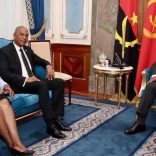Liverpool and Portugal forward Diogo Jota dies at 28 in car crash
Angolans & foreigners forbidden to leave the country with more than US$10,000

The Angolan authorities have cut by a third the maximum amount of currency residents can take out of the country, claiming that capital flight could jeopardize the country’s monetary stability.
The measure was taken at an economic committee cabinet meeting Thursday in Luanda, and caps the amount at US$10,000 for adults and US$3,500 for minors per trip, against the previous $15,000 and $5,000 respectively.
“This has to do with the need to protect the currency within the national territory, because we are finding that the flight of hard currency is putting our monetary stability at stake,” central bank governor Valter Filipe da Silva announced at the end of the meeting.
The measure affects both nationals and foreigners residing in Angola, who will now have the same limit, as well as non-residents.
Since the end of 2014 Angola has faced a deep financial and economic crisis as a result of the fall in international oil prices cutting revenues from crude exports by more than a half in the space of a year.
The International Monetary Fund (IMF) said on Wednesday that Angola had requested an assistance program for the next three years, the terms of which will be discussed at the spring meetings in Washington and in a visit to the country.
Angolan finance minister Armando Manuel denied that this was an economic rescue package, saying that the request will be for funding for medium term economic diversification so as to develop new exports and foreign exchange inflows.
In two years, the Angolan NIR lost nearly six billion euros from historic 2013 highs before the oil price crisis. Quoting a monthly Angolan central bank report, Lusa reported in March that Angolan international reserves had declined almost 250 million euros in February compared to the first month of the year.
Foreign currency reserves are needed to ensure pay for imports of raw material and food, and the continued decline over more than a year and a half are held to be the result of the international oil price crisis reducing revenues and foreign exchange inflows.
The Angolan government maintains the country ended 2015 with sufficient funds to pay for more than six months of imports, the lowest figure in five years.












Leave a Reply
Be the First to Comment!
You must be logged in to post a comment.
You must be logged in to post a comment.